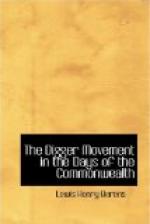“It is a quality of faith that it wrings the neck of reason and strangles the beast, which else the whole world, with all creatures, could not strangle. But how? It holds to God’s word: lets it be right and true, no matter how foolish and impossible it sounds. So did Abraham take his reason captive and slay it.... There is no doubt faith and reason mightily fell out in Abraham’s heart, yet at last did faith get the better, and overcame and strangled reason, the all-cruelest and most fatal enemy to God. So, too, do all other faithful men who enter with Abraham the gloom and hidden darkness of faith; they strangle reason ... and thereby offer to God the all-acceptablest sacrifice and service that can ever be brought to Him.”
However, whatever may have been the personal desires and tendencies of those associated with its earlier manifestations, the forces of which the Reformation was the outcome were not to be controlled by them. The spirit of which they were the product was not to be controlled by any fetters they could forge. The Reformation emancipated the intellect of Europe from the yoke of tradition and blind obedience to authority; it let loose the illuming flood of thought which had been accumulating behind the more rigid barriers of the Church, and swept away as things of straw the feebler barriers the early Reformers would have erected to confine the thoughts of future generations. The futility of all such efforts we can gauge, they could not. Blind obedience to authority, in matters spiritual and temporal, had been the watchword and animating principle of the power against which they had rebelled; liberty and reason were the watchwords and animating principles of the movement of which they, owing to their rebellion, had temporarily become the recognised leaders. The right of private judgement, in other words, the supremacy of reason as sole judge and arbiter of all matters, spiritual as well as secular, was the essential element of the movement of which the Reformation was the outcome; how, then, could they, the children of this movement, hope to change its course?
When considering the forces and circumstances that made the Reformation possible, when so many equally earnest previous attempts in the same direction had failed, we should not lose sight of the favourable political situation. Under cover of its religious authority, by means of its unrivalled organisation, as well as by its temporal control of large areas of the richest and most fertile land in Europe, the Church of Rome annually drained into Italy a large part of the surplus wealth of every country that recognised its spiritual authority. Such countries were impoverished to support not only the resident but an absentee priesthood, and to enable the Princes of the Church to maintain a more than princely state at Rome. This was a standing grievance even in the eyes of many sincerely devout Churchmen, and one which was prone to make statesmen and politicians




